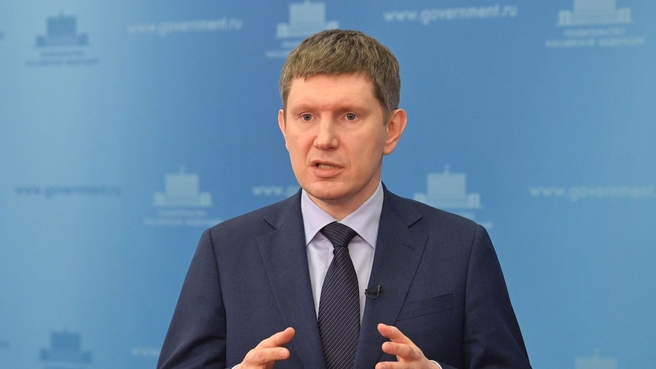Maxim Reshetnikov: The Board of the Eurasian Economic Сommission has held a meeting, where a highly important package of measures, drafted by a high-level working group, was discussed. The group includes representatives of the economic ministries, central banks, and finance ministries of all EAEU countries. This is a large package of priority measures designed to stabilise the current situation. It includes 33 measures intended to implement customs regulation, stabilise financial markets and mutual payments, and streamline the EAEU’s systemic development.
It was a large-scale effort that we assiduously pursued over the last two weeks. Why it is important to ensure this type of synchronisation and integration at the EAEU level? Here are a few points.
First, trade with the EAEU countries amounts to practically 15% of our countries’ total trade. Second, the volume of trade grows from year to year, and has increased by more than a third on 2020. But even if we deduct the reduction owing to Covid-19 in 2020, the volume has grown by 17% in comparison with 2019 levels. I mean we understand that this mutual trade creates jobs in our countries and makes it possible for us to maintain cooperation. This is why it is so important to retain the EAEU’s unified, primarily trade-related, space under these difficult circumstances. Moreover, all decisions related to import rates, import duties, import benefits, quotas, etc., have been handed over to the EAEU. This means that the total quantity of goods brought to our unified customs territory proceeds under unified rules, unified certificates, and so on.
This is why it has been highly important to synchronise these issues in a period when countries, primarily Russia and Belarus, are facing sanctions, logistical problems, and import restrictions. The plan that has been devised does synchronise these issues. More than that, the plan is already being implemented and a number crucial problems were solved at yesterday’s Board meeting.
First of all, this, of course, concerns import duties. Yesterday, we eliminated duties on 458 import positions. The Russian Federation receives $19 billion worth of imports from these positions. Importers and, in the long run, consumers will save over $500 million. In other words, this measure should reduce the pressure on prices. And, of course, this includes highly important supplies for Russian enterprises. These issues are linked with food, primarily baby food, purees, etc. This includes components for the engineering sector’s goods, transport systems, in the first place. Add to this components for the chemical industry, important construction elements for stabilising construction materials markets, etc. In fact, 458 positions makes a very long list, and this work will continue in the future.
We discussed the second highly important matter, namely, mutual payments and settlements in roubles. In other words, duties received by each country are then divided in certain proportions, as formalised by the Union Treaty, and are accordingly transferred to the budgets of the relevant countries. Earlier, this involved the use of foreign currency. We have now agreed to introduce payments and settlements in national currencies, stage by stage. Russia finds it highly important that most of the duties being received and divided by us will be calculated in roubles. We have therefore started establishing a common rouble zone.
Some important matters are linked with simplified import procedures. We have discussed these matters here, at the national level, and we have adopted temporary decisions. And now, we are formalising them at the supra-national level, at the level of all Union countries…
First of all, this concerns the use of copies of certificates confirming the quality and safety of goods. Earlier, it was necessary to provide the original documents in all cases they were delivered by air, etc., but now importers are facing problems. To facilitate such uninterrupted deliveries, we have analysed all these procedures, and we have approved many of them. We will continue our work, as there are quite a few matters, and every country has its own nuances and positions. But it is very important that we have helped resolve these matters, many of which had been discussed by us for years, in such a short time. We have achieved results in two or three weeks, while working hard on instructions from the leadership of our countries, and positive momentum is underway.
